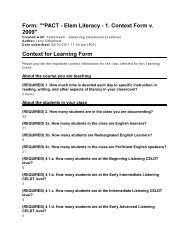The Tutoring Book - California State University, Sacramento
The Tutoring Book - California State University, Sacramento
The Tutoring Book - California State University, Sacramento
Create successful ePaper yourself
Turn your PDF publications into a flip-book with our unique Google optimized e-Paper software.
Reading in the Writing Center! What?<br />
76<br />
Sharon Cooper<br />
Nicole Scanlan<br />
Spring 2010<br />
Many assumptions are made about what happens in the writing center. It is often thought that we<br />
are a one-stop shop for grammar and punctuation. Yet, as tutors we know that our job is more complex<br />
than that. We are given the challenge of helping students become better writers. This involves much more<br />
than simple lower-order concerns. Each of us may struggle to find a way to help our students. We suggest<br />
that one of the best ways to help a struggling writer is to read in the writing center.<br />
In his English 125B class, Angus Dunstan uses this quote: "<strong>The</strong>re is nothing else we ask all our<br />
students to do in school that even approaches writing in the intellectual and psychological demands that it<br />
make on students." This is truth tested every day in the writing center where student tutors and tutees<br />
collaborate in an effort to improve the tutee’s writing. We developed the idea for this article from a<br />
discussion we had in the tutor lounge about how academic writing overwhelms students with marginal<br />
reading skills. We conclude that certain tutees need far more from the writing center than focus on their<br />
lower order concerns, although most of them tend to think that grammar and syntax is their major<br />
problem. While we do not wish, in anyway, to diminish the important role prescriptive grammar play in<br />
academic discourse, our topic focuses on what occurs before the tutee ever begins to write. It is our<br />
sincere hope that our discussion will prove useful to you in your own efforts to make a difference.<br />
Some <strong>The</strong>oretical Background<br />
In a 2002 report, <strong>The</strong> Academic Senate for <strong>California</strong> Community Colleges (ASCCC) states that<br />
good academic writing is a response to analytical reading. <strong>The</strong>ir finding is supported by a survey of<br />
<strong>California</strong> College and <strong>University</strong> faculty which shows a positive correlation between analytical reading<br />
and student success: 90% at UC; 71% CSU; and CCC 83%. This survey repeatedly identifies reading as<br />
the most significant factor in the success of college students. Three fundamental reading competencies<br />
prove essential: Reading for literal comprehension and retention, reading for depth of understanding, and<br />
reading for analysis and interaction with the text. Gary Griswold’s article about tutoring reading, In<br />
Postsecondary Reading: What Writer Center Tutors Need to Know, provides support for the ASCCC<br />
findings and gives evidence that tutors are supportive of reading in the Writing Center. Every tutor<br />
Griswold interviewed expressed concern about the reading skills of students they see. Most felt that their<br />
students did not have problems actually reading the words on the page but rather had difficulty engaging<br />
critically with the text and distinguishing between key points and supporting evidence.<br />
Though students regularly have issues with literary analysis, Griswold's article also suggests that<br />
they have unique problems dealing with infotexts, such as textbooks and academic essays. All tutors<br />
interviewed believed that helping students become better readers is of importance in teaching writing.<br />
Griswold voices encouragement for the role of reading in writing centers by stating that tutors should be<br />
aware that a lack of formal course work in the teaching of reading does not mean they cannot be of great<br />
assistance to students, just like tutors who do not consider themselves grammarians but who, nonetheless,<br />
have acquired the ability to write and tutor grammatically correct English prose. He concludes that if<br />
writing center tutors receive even minimal training on and information about reading theory, they can<br />
develop a concept of how reading is best taught just as they have done with concepts or strategies for<br />
teaching writing. By formulating and incorporating specific reading strategies in their tutee sessions,<br />
tutors can improve a tutee’s reading ability, which will, in turn, improve the individual’s writing ability.

















